I agree of course, and I doubt many here are actually disagreeing. I also don't think designing is binary either though, which is what I keep seeing in the replies. I don't think it just EITHER (a) design for the experience only or (b) Design with the absolute top specs.
My point is there is plenty of middle ground here. Saying they needed a bigger battery, doesn't put them in column (b), it just means consumer demand is dictating this and most folks want this and would benefit from this. There are plenty of other examples too. I just think it's important to realize that just because a potential user thinks Google blew it by not <adding xzy>, doesn't mean they think Google needs to go all out on specs like Samsung.
There is an option (c) is all



